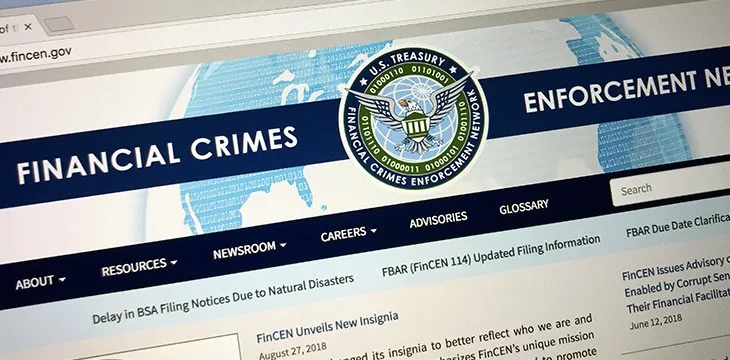|
Getting your Trinity Audio player ready...
|
Cryptocurrencies, and those developing them, must conform to existing anti-money laundering (AML) principles or face action, said the deputy director of the U.S. Treasury Department’s Financial Crimes Enforcement Network (FinCEN). He called on those developing such monetary systems to make sure they’re transparent enough to allow financial crimes investigators to do their jobs—opening a potential opportunity for Bitcoin (BSV).
Deputy Director Jamal El-Hindi issued the warning on February 6, 2020, at the Securities Industry and Financial Markets Association’s (SIFMA) 20th annual anti-money laundering and financial crimes conference in New York City.
FinCEN has long taken an interest in money “substitutes” such as Bitcoin and cryptocurrencies, adding exchanges (but not developers or users) to its definition of money services businesses as early as 2011. While it has never opposed the development of cryptocurrency technology itself, it has since regularly issued warnings that those operating in the industry must abide by the same rules as the existing financial system to combat money laundering, terrorism financing, and other financial crimes.
El-Hindi said:
Let me take this opportunity to emphasize that actors working in these new systems for moving value are subject to the same AML principles and requirements as other financial institutions. Social media and messaging platforms and others now focusing on the establishment of cryptocurrencies cannot turn a blind eye to illicit transactions that they may be fostering.
That’s likely a reference to Facebook’s Libra project, which aims to create a cryptocurrency “stablecoin” asset backed by a basket of existing national currencies. The blockchain and technology industries initially took great interest in the project, but it soon drew criticisms and warnings from several government and central bank officials over whether it could work in compliance with existing financial regulations.
Major industry partners such as Vodafone and Mastercard soon disassociated themselves from the project, some citing “strategy” issues—but also possibly fearing pressure from national governments who set the rules for other aspects of their businesses.
However, interest in the concept itself, and in digitizing national fiat currencies on a reliable blockchain-based network somehow, remains strong. The problem for central banks exploring such an option is, though, how can you ensure the blockchain has the capacity, or is transparent and trustworthy enough to meet their standards?
This is where Bitcoin’s global on-chain scaling capabilities and locked protocol come into play. No other blockchain has the ability to handle government and corporate-tier demands. As a universal ledger of truth, it could provide exactly the platform these large entities are looking for. Its contract and tokenization capabilities could even see national fiat currencies and Bitcoin living on the same blockchain.
FinCEN is watching the cryptocurrency industry closely and would not allow less-transparent, parallel financial systems emerge, El-Hindi added.
As we’ve said on other occasions, to the extent that the financial sector chooses to move forward with the opportunities that some of these emerging systems present, we are not going to allow it to slide backward on the protections and appropriate transparency that we have collectively worked so hard to weave into the financial system.
Think about those words whenever you hear supporters of certain blockchain projects tout “features” like total anonymity, or use language that sounds like an attack on banks and governments. All their braggadocio would be meaningless in the face of a truly concerted enforcement effort—both governments and large corporations have powerful resources at their disposal, and could easily render a cryptocurrency useless should they ever choose to.
“Make no mistake about it, whether it is through existing rules and guidance or future rules and guidance, we will regulate in this space consistent with the existing principles underlying the BSA/AML regime. Industry will have to develop its new products and services to ensure appropriate transparency for law enforcement and national security purposes. And where that doesn’t happen, we have the ability to protect our financial system,” El-Hindi said.
Bitcoin (BSV) does not seek to destroy banks, or topple governments. Its aim is to make them more accountable for their actions. Enforcement action against legitimate bad actors should not be frowned upon, even by the liberty-minded—nor should efforts to curb government and corporate corruption.
FinCEN has made it clear that transparency and accountability is what it wants—and make no mistake, FinCEN will get what it wants. Think of that as an opportunity, not a threat, to demonstrate exactly what Bitcoin is and what it can do.

 06-30-2025
06-30-2025 





